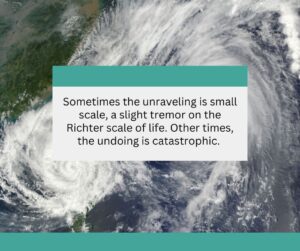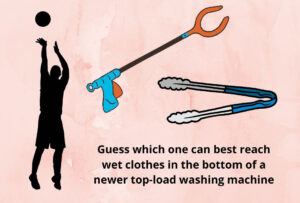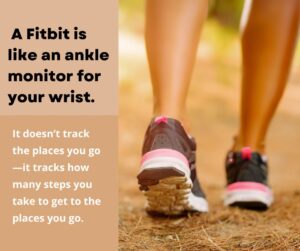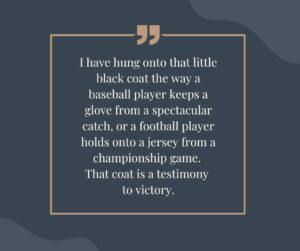Special dates on a calendar are punctuation marks in what could otherwise be one long, winding, rambling sentence spanning years. They are restful pauses, a contrast to the routine, something to look forward to.
Then it happens. The special events come undone and plans unravel.
You might as well knock over an extra-large latte on a desk calendar and watch the ink bleed and the coffee puddle into the shape and size of Lake Michigan.
The once-beautiful forecast for an outdoor event turns to severe storms with heavy winds and damaging hail.
You’re hosting a family get together and at 10 the night before one wing of the family calls to say someone tested positive for Covid. Again.
You arrive at a long-awaited trip to the beach and are met by purple flags snapping in the wind, warning of a jellyfish infestation.
Sometimes the unraveling is small scale, a slight tremor on the Richter scale of life. Other times, the undoing is catastrophic. The earth shakes, the ground cracks and threatens to swallow you whole.
A loved one is whisked off for emergency surgery.
Test results are back and they’re not good.
A horrific phone call with a voice saying, “There’s been an accident.”
You’d think we would grow accustomed to managing abrupt structural shifts of life, but it’s not just the logistics of change. There’s the emotional roller coaster of disappointment, dashed hopes and altered expectations.
We all have things to do, places to go, people to see.
One of the greatest skill sets in life is being able to adapt and meet new challenges, both large and small and in between.
One of my favorite Bible verses is one you don’t see in a lovely calligraphy hanging on someone’s wall, stenciled on tote bags or coffee cups. It is the verse where Jesus said, “In this world you will have trouble.”
Some translations say tribulation.
I find that verse affirming and reassuring on those nights I fall into bed exhausted, spent and completely wrung out. It is the reverb of trial and tribulation. A part of life. To be expected.
Even better than knowing difficulty is part of the landscape is the second part of the verse: “But take heart, I have overcome the world.” The affirmation that life is hard, for days or for seasons, is followed by encouragement and hope.
They say the race belongs to the swift and we duly shower awards and medals on those with lightning speed and incredible strength. But never, ever, ever count out those who move slowly, navigating life’s trials and tribulations one radiation treatment, one round of chemo, one physical therapy appointment at a time, one step and one day at a time, courageously leaning in to changing circumstances and new challenges.
It is the plodders and the overcomers who are the truly strong among us.












